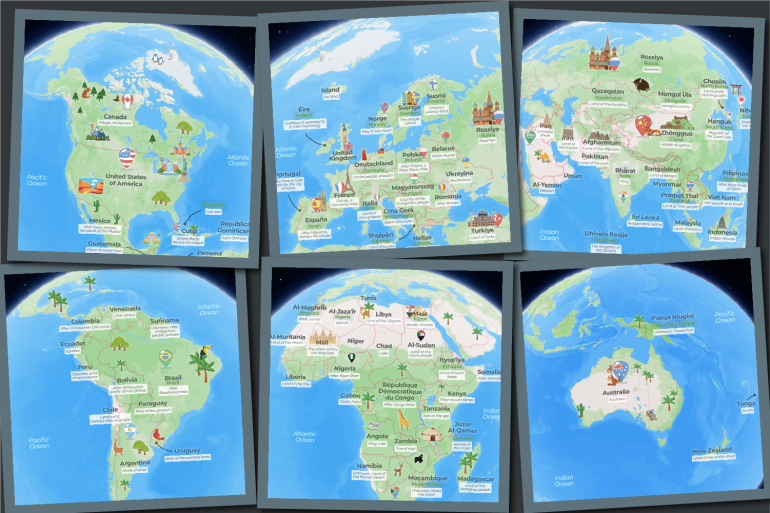There are more than 7,000 languages spoken worldwide across nearly 200 countries.
This vast linguistic diversity influences how nations refer to themselves, with many using names in their native languages that differ from their commonly known English versions.
Every year, on February 21, the United Nations observes International Mother Language Day to promote “the preservation and protection of all languages spoken by the peoples of the world”.
This date marks a historic event in 1952 when students in Dhaka protested for the recognition of Bengali as an official language in East Pakistan, now Bangladesh. Four students were killed, leading to mass protests that eventually led to Bengali being recognised as an official language in 1956.
In the following visual explainer, Al Jazeera maps the names and meanings of countries around the world.
Africa: from Masr for Egypt to Mzansi for South Africa
The African continent, with nearly 3,000 languages spoken across 54 countries, is one of the most linguistically diverse regions in the world.
Many African country names are rooted in colonial history, with others stemming from the influence of Portuguese and Arabic traders and exporters.
Egypt, one of the oldest countries in Africa, calls itself Masr in Arabic, thought to come from the word “Mizraim”, a reference to the ancient civilisation’s name for the region, also believed to mean “border” or “the port”.
Liberia derives its name from the Latin word “liber”, meaning “free”, reflecting the country’s founding by freed African American slaves in the 1820s.
In South Africa, Mzansi is widely used to refer to the country in a more informal and affectionate way. The term originates from the Zulu word “uMzansi,” which means “south.”

Asia: ‘Middle Kingdom’ and the ‘Origin of the Sun’
Asia, home to about 4.8 billion people, is a linguistic hub with more than 2,300 languages spoken across the world’s largest continent.
The English name for China is believed to have originated from the Qin (or Ch’in) dynasty. However, within China, the country is called “Zhongguo”, which translates to “Middle Kingdom” or “Central Country,” reflecting the traditional Chinese view of China as the centre of civilisation.
In India, the country is often called Bharat, a Sanskrit term found in scriptures dating back about 2,000 years. Another name for the country is Hindustan, meaning “land of the Hindus” in Urdu. The English name for India comes from the River Indus, a key feature in ancient Indian civilisation.
In Japanese, Japan is called Nihon or Nippon. The name comes from the characters “ni” meaning “sun” and “hon” meaning “origin”, so Nihon or Nippon translates to “origin of the sun”. This refers to Japan’s location to the east of China, where the sun rises and is the source of the country’s nickname “Land of the Rising Sun”.

Europe: Shqiperi for Albania, Magyarorszag for Hungary
Europe, with more than 40 countries and many languages, has names that are mostly different from those we’re familiar with in English, with many varying significantly.
Albania, for instance, is known as Shqiperi in Albanian. The name comes from the word “shqiptar”, meaning an Albanian person, and is thought to refer to speaking clearly, or understandably. Some also associate it with “shqiponje”, the word for “eagle”, which is the country’s national symbol.
Hungary is called Magyarorszag in Hungarian. The name “Magyar” refers to the Hungarian people and “orszag” means “country” so together, Magyarorszag means “Land of the Magyars”. The name “Hungary” in English comes from the Latin Hungaria, which was used by the Romans to refer to the region.
Ukraine’s name comes from the Old Slavic word “Ukrayina”, which means “borderland” or “region,” reflecting its historical position on the frontier of various empires and kingdoms.

North and Central America: ‘Low Sea’ and ‘The place of the Mexica’
Like Africa, the majority of the country names in North and Central America were influenced by colonial powers, primarily from Spain, the United Kingdom, France and Portugal.
The Bahamas, for example, was the first place where Christopher Columbus, the Italian explorer and navigator, “claimed” land for the Spanish crown, according to the Gilder Lehman Institute of American History. Columbus initially named the island San Salvador, which is believed to be one of the islands in present-day Bahamas. The area was later renamed the Bahamas, derived from the Spanish “baja mar”, meaning “low sea.”
Similarly, Costa Rica, in Spanish meaning “Rich Coast”, is believed to have been named by Christopher Columbus when he arrived on the country’s shores in 1502, likely due to the abundance of gold and other resources he encountered there.
The name Mexico comes from the Nahuatl word Mexihco, which referred to the heart of the Aztec Empire around their capital, Tenochtitlan, now Mexico City. Meaning “place of the Mexica” and named after the Aztec people, it reflects Mexico’s deep Indigenous heritage, long before Spanish influence.

Oceania: Aotearoa for New Zealand, ‘southern’ for Tonga
Oceania consists of fourteen countries, many of which still use their native names in English, though the spellings may vary.
Australia is named after the Latin word “australis”, meaning “southern,” reflecting its position in the Southern Hemisphere. The name was popularised by the English navigator Matthew Flinders, who used it in reference to the landmass when he circumnavigated the continent in the early 1800s. Prior to that, the continent was often referred to as “New Holland” by European explorers.
In the Indigenous Maori language, New Zealand is called Aotearoa. The name, often translated as “Land of the Long White Cloud,” is widely used alongside New Zealand and has strong cultural significance for the Maori people.
The name Tonga, derived from the native Tongan language, means “south” or “southern” and is believed to reflect the island nation’s position in the southern Pacific Ocean. The full name, Kingdom of Tonga, refers to the islands themselves, located south of other Pacific islands such as Fiji and Samoa.

South America: ‘Land of water’
Once home to more than a thousand languages and close to a hundred linguistic families, according to Encyclopaedia Britannica, today somewhere between 200 and 400 languages are spoken across the twelve countries of South America.
The continent contains more than a quarter of the world’s freshwater resources, and many of its Indigenous country names are rooted in water.
Guyana, for instance, the only country in South America with English as an official language, has its name derived from the Indigenous word “Guiana”, believed to mean “land of water”.
Similarly, Paraguay, got its name from the Guarani word “par” meaning river, and “guay”, meaning “this side”, while Uruguay, takes its name after the River Uruguay, also believed to have come from Guarani for “river of painted birds”, or in another version “river of painted snails”.
Venezuela’s name comes from the Italian “Veneziola”, meaning “Little Venice”. Spanish explorers named it after seeing Indigenous stilt houses along Lake Maracaibo, which resembled those in Venice, Italy.







